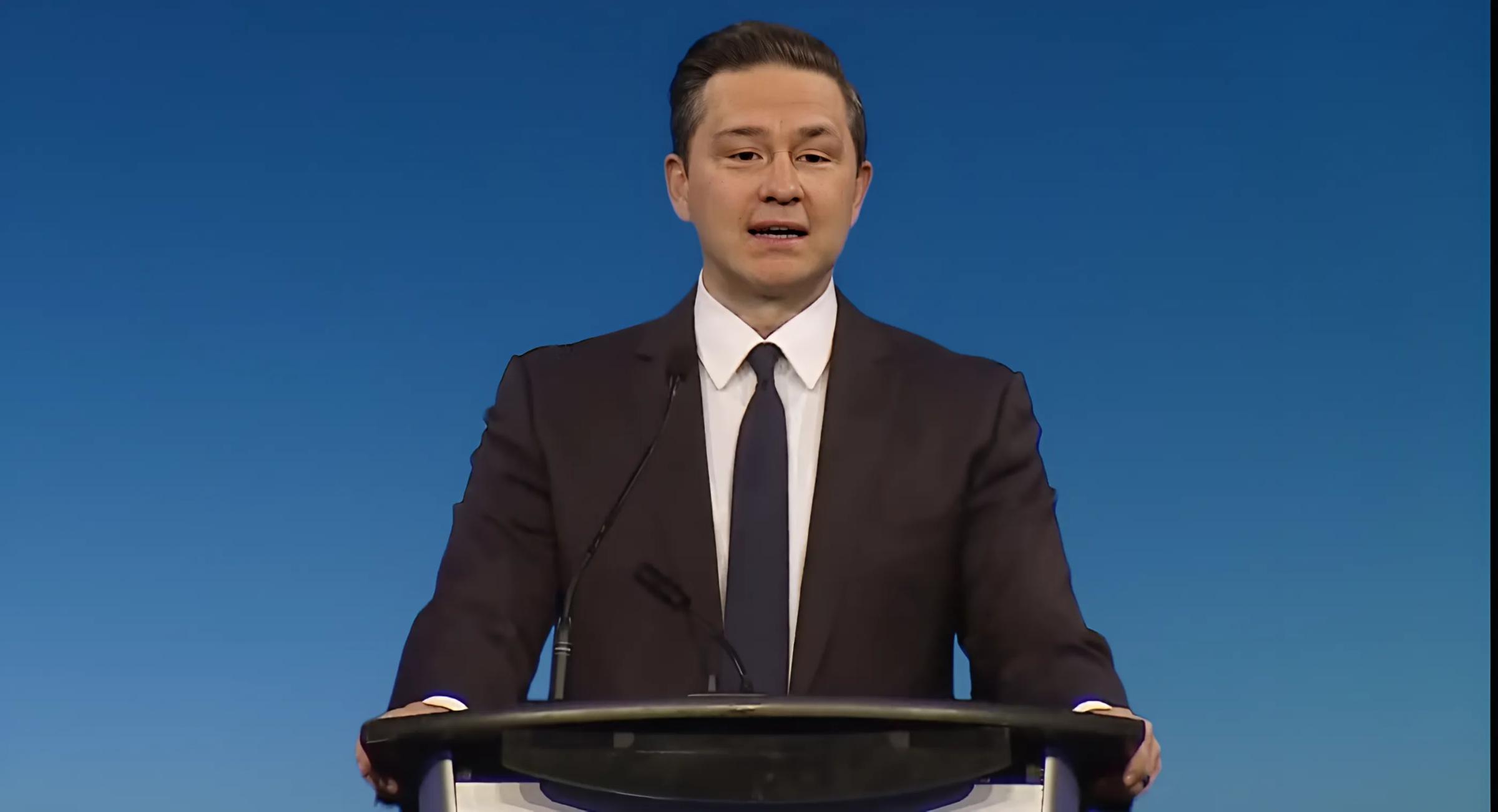Conservative Party leader Pierre Poilievre has announced his intent to table a motion of non-confidence against Liberal government in a press conference held outside the House of Commons today.
Poilievre described the current state of Canada as a “broken promise,” contrasting it with the country’s historical ethos of hard work and opportunity for all. Citing rising costs of living, increasing housing prices, and controversial carbon tax hikes, Poilievre asserted that Trudeau’s administration has caused undue financial strain on Canadians. He vowed to take action, starting with a confidence vote, which could trigger an early federal election.
He emphasized that the most immediate threat to the Canadian economy is the ongoing increase in carbon taxes, which he claims has severely impacted household budgets and the industrial sector. Referring to the carbon tax as a “tax on everything,” Poilievre detailed how the cost of gasoline alone had already risen by 17 cents per litre under the current policy, with planned future increases raising that figure to 61 cents per litre.
“Trucks and trains that deliver goods to our supermarkets will stop rolling,” Poilievre stated. “It would be like a nuclear winter for our economy.”
He pointed to the carbon tax as a major driver behind rising food prices, transportation costs, and what he described as a “crippling” burden on everyday Canadians. Poilievre claims that the cumulative effects of these policies have left many struggling to afford basic necessities.
In addition to economic concerns, Poilievre called attention to the growing housing crisis, which he attributed to the government’s handling of fiscal policies and taxes. He argued that under Trudeau’s leadership, housing prices in Canada have risen faster than in any other G7 nation, with the average home now costing 25 to 45 percent more than in comparable countries.
“We have middle-class workers living in cars and tents. Tent cities have become common in once-pristine parks across the country,” he said.
According to Poilievre, the combination of soaring home prices and stagnant wages has left many Canadians priced out of the housing market, forcing families to make difficult choices about their living situations. He also tied this crisis to the government’s immigration and international student policies, suggesting that an unchecked influx of newcomers is exacerbating the housing shortage.
Also, Poilievre questioned whether Singh would continue to support the Liberal government in light of their shared policy failures. The Conservative leader referenced Singh’s recent video in which the NDP leader appeared to distance himself from Trudeau’s government, claiming the coalition was damaging to the country.
“If you’re pulling out of the costly coalition, you have to vote non-confidence,” Poilievre said. “Otherwise, you’re still in the agreement, no matter what your video stunt would have everyone else believe.”
The confidence vote, according to Poilievre, will be a test for Singh and his party. If the NDP does not support the motion, Poilievre suggested it would signal continued support for policies that have “hurt Canadians.”
Throughout the press conference, Poilievre reiterated that the Liberal-NDP coalition, in place since 2022, has failed to deliver on key promises while plunging Canada into deeper financial and social crises. He cited rising crime rates, including an increase in gun violence, as another area where Trudeau’s policies have faltered.
Poilievre also took aim at the speculation surrounding Mark Carney, former Bank of Canada governor, who many believe is being positioned to take a more prominent role in Trudeau’s government. Poilievre expressed concerns that Carney’s involvement would lead to even higher carbon taxes and more aggressive climate policies, which he claims would be detrimental to the Canadian economy.
“We don’t need a phantom finance minister,” Poilievre declared, urging Carney to openly disclose his financial interests and agenda if he intends to influence national policy.
Poilievre concluded by stating that his Conservative Party will table a non-confidence motion at the earliest opportunity, which could pave the way for a federal election centered on the controversial carbon tax and other economic issues. He called on Canadians to reject the “tax and spend” agenda of the Liberals and NDP and instead elect what he termed a “common-sense Conservative government.”
“It’s time to restore the Canadian promise, where hard work earns a powerful paycheck that buys affordable food, gas, and homes,” Poilievre said.
As Pierre Poilievre readies his party for a confidence vote, the political landscape in Ottawa is fraught with uncertainty. The coming weeks will determine not only the fate of the Trudeau government but also the broader direction of Canada’s economic and social policies.
For Canadians, the choice may come down to whether they support the continued approach of the Liberal-NDP coalition or align themselves with Poilievre’s vision of economic reform and reduced taxation.

